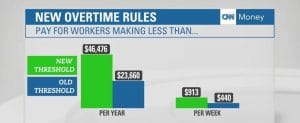For the first time since 2005, the United States Department of Labor has issued an updated regulation automatically extending overtime pay eligibility to 4.2 million “white collar” workers previously exempted from the Fair Labor Standards Act overtime pay requirements. The updated regulation is almost certain to swell payroll costs and increase wage and hour lawsuits.
Under the current regulations, a “white collar” worker, otherwise meeting the standard duties test to be considered exempt from overtime, must be paid a salary of $455 per week ($23,660 annually for a full-year worker). The updated regulation more than doubled the minimum salary required for an employee to be exempt from overtime (to $913 per week, $47,476 annually for a full-year worker).
The new regulation also changed the annual compensation required for other employees to qualify for the exemption and the employer’s ability to use other compensation to satisfy the increased salary requirements.
The new regulation is set to take effect on December 1, 2016, and is certain to surge payroll costs.
Beginning December 1, 2016, any previously exempt employees who do not meet the new salary requirements will no longer be considered exempt, entitling the employees to overtime, and many other protections of federal and state labor laws.
Prior to December 1, 2016, employers must conduct a thorough wage and hour audit to determine whether employee classifications will still be correct based on changes to the new salary thresholds. 
The Labor Department finalized a new rule that’s expected to make an additional 4.2 million salaried workers eligible for overtime pay. The rule, intended to boost low and middle-income wages that largely have stagnated, takes effect December 1.
It is important to recognize that, while the new regulations have increased the salary thresholds, salary level is not the only factor as to whether an employee qualifies for the “white collar” exemptions. Employees must also meet a duties test to qualify under the exemptions.
RPNA will be pleased to guide you through this substantial change in the labor law and develop strategies and creative solutions to minimize payroll costs while complying with the new regulations. RPNA is also experienced in defending against all employment related claims, including claims for failure to pay overtime.

